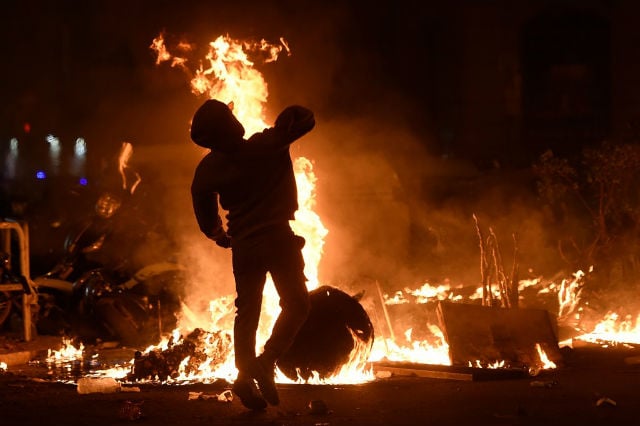- IN PICS: 'Freedom marchers' from across Catalonia converge on Barcelona
- Barcelona protests: General strike shuts down Catalonia
- Roads blocked between France and Spain by Catalan separatist protesters
STRIKES
Violent clashes break out in Barcelona on Friday night
Violent clashes escalated in Barcelona late on Friday, as radical Catalan separatists hurled rocks and fireworks at police, who responded with teargas and rubber bullets.
Published: 19 October 2019 09:00 CEST

A protester throws an object in front of a burning barricade during clashes near the Police headquarters in Barcelona. Photo: Josep Lago/AFP
The deterioration came on the fifth consecutive day of protests in the Catalan capital and elsewhere over a Spanish court's jailing of nine separatist leaders on sedition charges over a failed independence bid two years ago.
Around half a million people rallied in Barcelona earlier on Friday, police said, in the biggest gathering since Monday's court ruling as separatists also called a general strike in the major tourist destination.
But while most marchers appeared peaceful, hordes of young protesters went on the rampage near the police headquarters, igniting a huge blaze that sent plumes of black smoke into the air, as police fired teargas to disperse them, an AFP correspondent said.
Other fires raged near Plaza de Catalunya at the top of the tourist hotspot Las Ramblas, where hundreds of demonstrators rallied in defiance of the police, who tried to disperse them with water cannon.
“Anti-fascist Catalonia!” they roared. “The streets will always be ours!” .Scores of police vans could be seen fanning out around the streets, their sirens screaming as the regional police warned people in a message in English on Twitter “not to approach” the city centre.
The situation later appeared calmer, according to a police spokesman.
READ ALSO:
Earlier, many thousands of “freedom marchers”, who had set out to walk from five regional towns on Wednesday, arrived in Barcelona wearing walking boots and carrying hiking poles.
The rally coincided with the general strike, prompting the cancellation of 57 flights, the closure of shops, business and several top tourist attractions, and slowing public transport to a trickle in a region that accounts for about a fifth of Spain's economic output.
Activists also cut off Catalonia's main cross-border highway with France.
'Reaction to injustice'
In downtown Barcelona, many shops and luxury outlets were closed on the city's Paseo de Gracia, with blackened, charred patches a testimony to the nightly clashes that have raged since Monday.
“With these demonstrations bringing this large city to a halt, we are using Barcelona like a microphone,” said 23-year-old engineering student Ramon Pararada. “It's all in reaction to the injustice,” he said.
Retired lawyer Jaume Enrich agreed, saying the court sentence was “the straw that broke the camel's back”.
“Madrid is putting Spanish unity above everything, including basic rights,” he told AFP, wearing a badge saying “No surrender”. Nearby, a banner fluttered reading “There are not enough cages for this many birds.”
Clashes and closures
The huge turnout came after yet another night of violent clashes, which Catalan regional interior minister Miquel Buch said involved “fewer incidents, but more violent”.
And Barcelona city council said the first three days of clashes had cost an estimated 1.57 million euros ($1.75 million) in damage, with mob violence damaging traffic lights, street signs, trees and the city's bike-share service.
Some 128 people have been arrested since Monday, while 207 police officers had been injured before the violence escalated on Friday, according to Interior Minister Fernando Grande-Marlaska.
The emergency services said about 500 people in the region have suffered injuries since the beginning of the week, including 60 in Barcelona on Friday. In Barcelona, Spain's top tourist destination, the Sagrada Familia basilica
closed as protesters massed outside, and the Liceu opera house cancelled Friday night's performance.
At the city's famed La Boqueria market, most of the stalls were shut, although Susana Medialdea, 53, was selling olives and pickles entirely dressed in yellow.
“I came in voluntarily to work but only as long as I could wear yellow to express my total disagreement with the sentence,” she told AFP. But another veteran stallholder took the opposite view.
“I am a real Catalan but I don't support this independence project at all, people are letting themselves be used, above all the youth,” said 75-year-old Carmen Isern.
Spain's Clasico postponed
With the region mired in chaos, football authorities cancelled the Barcelona and Real Madrid Clasico set for October 26 at the Camp Nou stadium. Both clubs had reportedly refused an offer to hold the match in Madrid.
And Manchester City's Catalan manager Pep Guardiola, an outspoken campaigner for the independence movement, urged European intervention to ease the crisis.
“The international community must help us to solve the conflict between Catalonia and Spain,” he said. “Some mediator from outside (must) help us sit (down) and talk.”
The Supreme Court's explosive decision has thrust the Catalan dispute to the heart of the political debate as Spain heads towards a fourth election in as many years, which will be held on November 10.
Url copied to clipboard!


 Please whitelist us to continue reading.
Please whitelist us to continue reading.
Member comments